lauryl glucoside
-
- Category :
Catalyst and Auxiliary/Surface Active Agent
- CAS NO : 110615-47-9
- EC NO :
- Molecular Formula : C18H36O6
- Main Specifications :
- Synonyms : Lauryl polyglucose;D-Glucopyranose, Oligomeric, C10-16-Alkyl Glycosides;D-Glucopyranose,Oligomeric,C10-C16-Alkylglycosides;Alkyl D-Glucopyranoside;(C10-16)Alkyl D-Glycopyranoside;APG 1214;GreenAPG 1214;
Molecular Structure:

Product description:
Name APG1214
INCI Name LAURYL GLUCOSIDE
CAS No. 110615-47-9
Appearance, 25°C Pale yellow liquid/paste
C chain distribution
<= C10
C12
C14
C16
(base substance: Fatty alcohol) 0%~4%
67%~75%
23%~30%
0%~2%
Active Content (100-water, wt %) ≥50.0
pH (10%aq solution) 11.5-12.5
Free Alcohol (wt %) ≤1.0
Ash (wt %) ≤4.0
Viscosity (mPa·s), 20°C ﹥3000
Butyl glucoside 0
Water (wt %) 47-50
Density (g/cm3), 25°C 1.07-1.09
DP 1.3-1.5
Surface tension (mN/m), 25°C, 0.1% 28-30
Microorganism (Total viable count , CFU/g) ≤10
Example of applications
APG1214 is a nonionic surfactant that provides superior detergency, emulsifying, penetrating and surface tension reduction properties. It shows good compatibility with all other types of surfactants. Synergistic and thickening effects can be found, especially when mixed with CAPB, SLS, SLES, etc. APG1214 is very effective in hard surface cleaning and processing. Like all APG products, APG1214 is mild and readily biodegradable.
Due to its unique performance in cleaning, emulsifying and thickening, APG1214 is widely used in personal care products, hard surface cleaners, I&I cleaners, agrochemical emulsifiers and formulations which require thickening effects.
Due to the presence of magnesium oxide (max. 300ppm) and the high pH value, turbidity, which has no negative effects on performance, may occur. When pH value is adjusted to neutral, its turbidity disappears. There may be crystallization when the product is stored at room temperature.
There may be sedimentation depending on storage time. In this case, the product should be heated and stirred until uniform before use.
